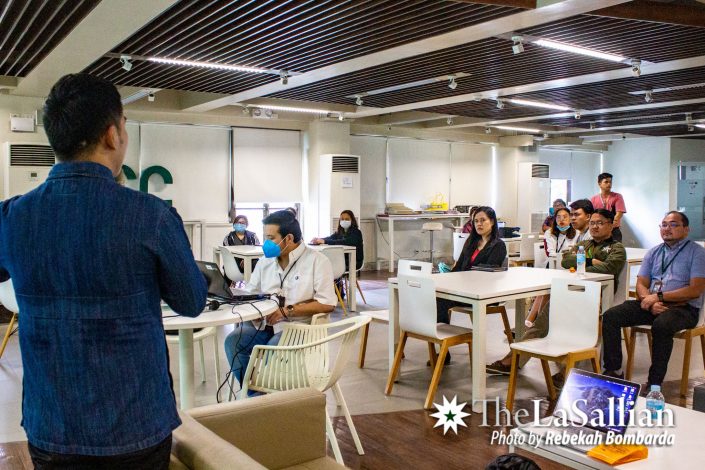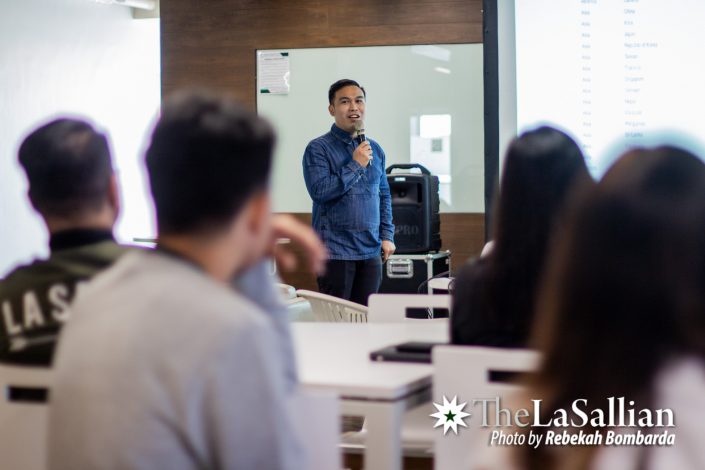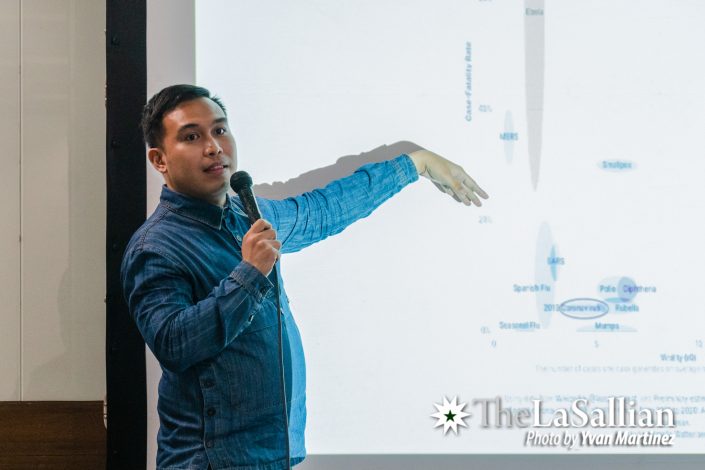“What’s happening right now is the fear of the unknown,” stressed Department of Health (DOH) Human Resources Management Officer Ebenezer Bonbon in a series of discussions entitled Learning Sessions on nCoV held at the University Student Government (USG) Students’ Lounge, third floor of Br. Connon Hall yesterday, February 5.
The talk, which delved into the details surrounding the 2019-novel coronavirus acute respiratory disease (2019-nCoV ARD) outbreak, was organized in order to bring “awareness to the student body,” as explained by USG Executive Secretary Earl Joseph Baillo. The event was spearheaded by the Office of Student Affairs; USG units; Office of Student Leadership Involvement, Formation and Empowerment; and the National Service Training Program and Formation Office.

By the numbers
Bonbon explained during the event that the timeline of the development of the outbreak began on December 30 of last year when Chinese health officers first reported the outbreak in Wuhan and it was reported to the World Health Organization (WHO) the day after. As of press time, there are currently 24,553 confirmed 2019-nCoV ARD cases worldwide—with 13 percent in critical condition—while the death toll is now 492. In the Philippines, the third confirmed case was also reported on February 5.
To address the mounting concern, Bonbon reiterated that the best way to keep oneself healthy is to strengthen the immune system, “If you are healthy, if you have a good diet, if your lifestyle is okay—then you are not [likely] to be infected with the 2019-nCoV ARD.” The DOH officer also mentioned how there is still no available vaccine against the 2019-nCoV ARD and warned that the public be cautious in seeking medications and alternative products to combat the spread of the virus.
Regarding the hoarding of medical supplies such as face masks, Bonbon commented that this, too, is not advisable. Surgical face masks usually have a shelf life of three years from its manufacturing date, while N95 masks last up to five years. These expiry dates are accurate as long as the masks maintain their packaging and kept in recommended storage conditions. Going beyond the expiration date, therefore, defeats the purpose of using these, Bonbon explained. In addition, “because face masks can only be used for around eight hours until you have to throw it away,” Bonbon suggested that the money used to buy these can instead be used to purchase hand sanitizers and rubbing alcohol.
‘Mindful fear’
When asked about whether the public reaction to the 2019-nCoV ARD outbreak is worse compared to that of the Ebola epidemic in 1976, and the 2009 H1N1 or the swine flu outbreak, Bonbon shared that while he believes that the public reaction is normal, “mindless fear is greater than mindful fear, and the fear of the unknown is almost always the root of all fear.”
Bonbon explained that students have the responsibility to study and to know what is right and wrong while emphasizing the importance of being vigilant in looking at news on the internet and to ensuring that information comes from official sources such as DOH and WHO. With this, he encouraged students to help the country through “advocating for health promotion” by empowering the public to prevent panic and misinformation amid the crisis. “We seek the truth or unmask the truth, that’s part of our social responsibility,” Bonbon stated.
Community efforts
Dr. Lily Ann Cabuling, Director of the Health Services Office (HSO), also shared her office’s and the University administration’s initiatives to prevent an outbreak within the campus. “The University has undertaken precautionary measures to prevent the spread of the virus through intensified monitoring,” she explained, mentioning the daily bulletins released through Help Desk Announcements that give the Lasallian community updates regarding the outbreak, as well as temperature scanning at the gates.
Cabuling then addressed the rumors about whether the University will suspend classes and office work. “Not at the moment,” she confirmed. “There is a committee that is establishing the protocol [to advise as to] when it should close down.”
The HSO director concluded the session by reminding the attendees to consult with their attending physicians if they are experiencing symptoms similar to that of the 2019-nCoV ARD, especially if they have travelled to countries that have confirmed cases of the virus. She further encouraged students and staff to protect themselves from infection by wearing face masks and washing hands frequently. “Avoid crowded places, stay calm, and remain vigilant at all times,” she urged, stressing the importance of staying informed and cooperating in preventing further cases.


